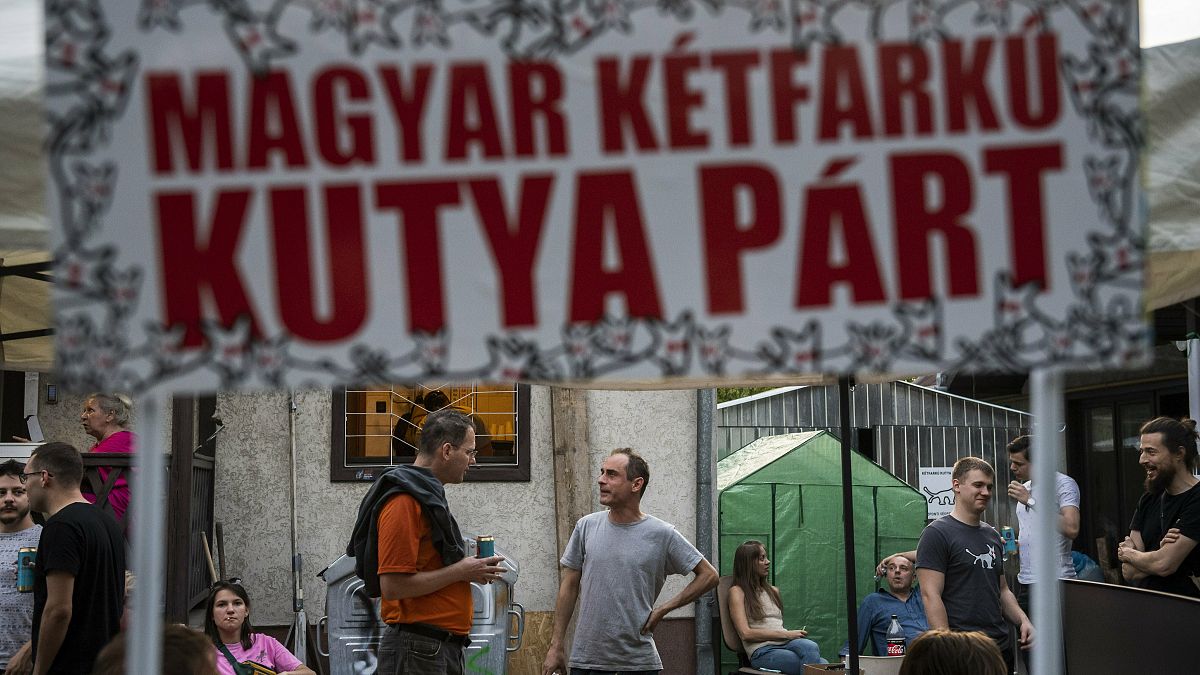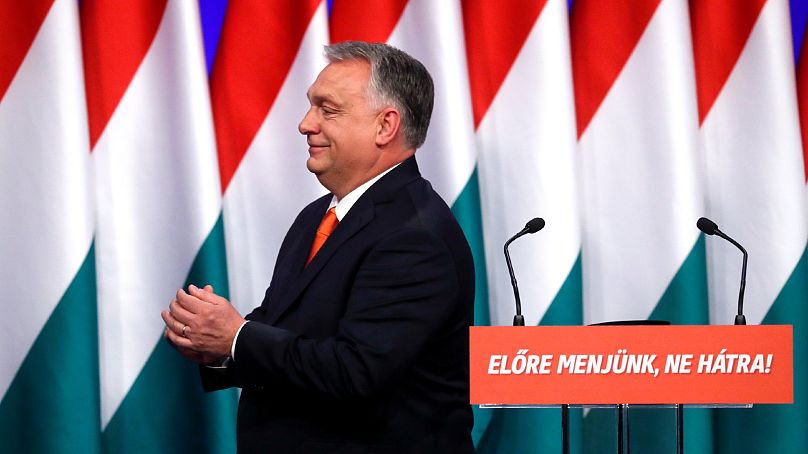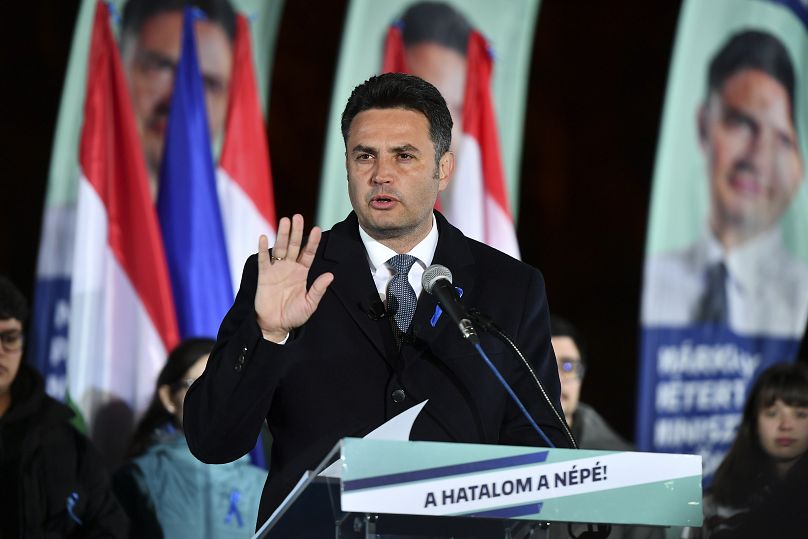The Two-Tailed Dog Party has trolled and teased its way through Hungary’s political system since it was founded as a movement in 2006. But is the joke running thin?
“I don't think it is important for others to vote,” said Gergely Kovács, president of the “joke” Hungarian Two-Tailed Dog Party, as he cast his ballot on Sunday afternoon in the country’s general election.
With a typical sardonic flourish, he said his party was confident of winning 100% of the vote after conducting a “representative one-man poll”.
Asked by reporters what the election meant to Hungary, he said the biggest threat was whether a galactic-colonial power would invade Earth.
The Two-Tailed Dog Party, or MKKP, has trolled and teased its way through Hungary’s political system since it was founded as a movement in 2006, its biting humour often standing in stark contrast to the earnest warnings by critics of Prime Minister Viktor Orban and his autocratic refashioning of politics since 2010.
But has the joking now stopped?
Orban’s ruling Fidesz party won a resounding victory in Sunday’s election, its fourth consecutive triumph, and secured yet another two-thirds majority in parliament.
The MKKP, which some opinion polls thought could win some seats in parliament, achieved just 3.3% of the vote.
“I’m sorry everyone, we wanted to get 5%,” Kovács told party supporters on election night, referring to the percentage threshold needed to enter Hungary's parliament.
One supporter loitering outside the Metro Club, a suave nightclub the MKKP made its election-night venue, summed up the result: “F**king bad”.
Potentially more damaging, the MKKP had come in for criticism after it decided not to join the six largest opposition parties in forming an anything-but-Orban alliance in December 2020.
In the months running up to the ballot, critics of the current government asserted that the MKKP was splitting the anti-Orban vote.
On election day, a former prime minister, Gordon Bajnai, said that a vote for the MKKP is a vote for Orban.
That critique appeared even more stinging on election night as United for Hungary, the opposition alliance, performed miserably. It won a little over a third of the vote and just 56 seats. By comparison, its composite parties had won 63 seats when competing individually in the 2018 election.
Zsuzsanna Döme, a MKKP co-chair, told a local news outlet that her party shouldn’t be asked about the poor performance of the united opposition.
Instead, voters should be asked why they did not vote for the coalition’s candidates, she said.
For Kovács, the president, the resounding defeat of the United For Hungary opposition was validation for not taking his party into the alliance.
“We can forget Péter Márki-Zay as a participant in Hungarian politics,” he was quoted saying, referring to the prime ministerial candidate of the opposition alliance. “But perhaps the others will learn the lesson.”
A short history of 'joke' parties in central Europe
Central Europe has a rich history of “joke” parties, although they tend to be fleeting.
The famed Czech writer Jaroslav Hašek in 1911 formed perhaps the first, the “The Party of Moderate Progress Within the Bounds of the Law”, a mockery of the status-quo conservatism of politicians in what was then the Austro-Hungarian empire.
Campaigning in a local election in Prague, Hašek pledged to reintroduce slavery, nationalise janitors, and make alcoholism mandatory.
Such political shenanigans wouldn’t return until near the end of the 20th century, put off by the horror of the First World War and subsequent invasions by authoritarian states, Nazi Germany and the Soviet Union.
In 1991, two years after communism fell, the Polish Beer-Lovers' Party won 16 seats in parliament at the country’s first free election in decades.
The Austrian Beer Party, created in 2014, won 1.8% of the vote at the Viennese state election in 2020.
One of the most successful “joke” parties in the region has been the German Die PARTEI, or “The Party”, which managed to win two seats in the 2019 European Parliament election.
'Joke parties serious about getting into parliament'
Similar to Hašek's campaigning in the early 1910s, the Hungarian MKKP is known for its ridiculous campaign pledges.
Where Hasek promised that his supporters would each receive “a small pocket aquarium”, the MKKP pledges have included two sunsets a day.
In the tradition of other Central European “joke” parties, it says every voter will get free beer for life if it wins.
But rather than being merely a joke, Kristof Horvath, a PhD candidate at King's College London conducting an ethnographic study of the MKKP, reckons the party is actually deeply “serious”.
“It’s more accurate to consider them a party with serious political goals that also happens to be funny and uses humour as a political instrument,” Horvath said.
“They are very serious about wanting to get into parliament.”
Its slogan is “The only sensible choice”. It takes a strong liberal, almost libertarian position on most issues. During the height of the 2015 migrant crisis, when the Hungarian government was admonished for forcing back refugees and physically building fences to keep them out, MKKP ran a billboard campaign proclaiming: “Come to Hungary by all means, we’re already working in London!”
Its first real election was in 2018, when it picked up 99,410 votes, or 1.7% of the overall share, and finished in seventh position. At the European Parliament election the following year, it won 2.6% of the overall vote.
However, it has managed to get members into positions of power. Döme, the party’s co-chair, is deputy mayor of Ferencváros, a central district of Budapest. Several members sit on local councils.
Countless public spaces across Hungary have been renovated and redecorated by MKKP, Horvath said, and in a practical sense, “the MKKP has had a bigger impact in the past 12 years than many of the parties within parliament.”
They campaigned ahead of this weekend’s election with a rather detailed programme that includes reforms to public procurement, increased transparency, and legalising the medicinal and recreational use of marijuana.
“It is a pity that we have not got in and marijuana will not be legal in Hungary from tomorrow,” Kovács told reporters.


